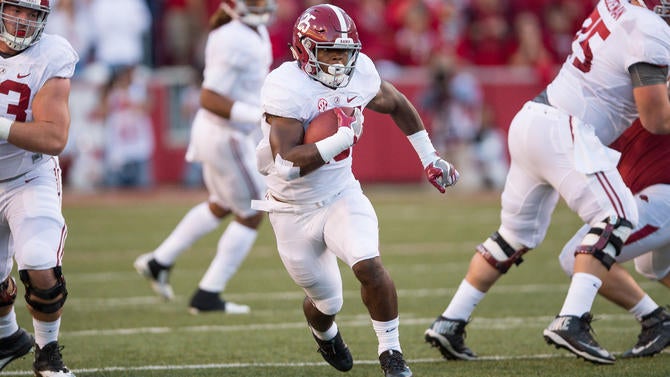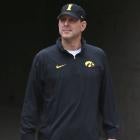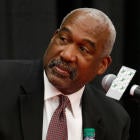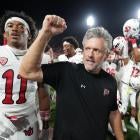Big 12 commissioner Bob Bowlsby knew criticism would come with the early signing period proposals pushed forward by the Football Oversight Committee, which he chairs. Alabama's Nick Saban and Ohio State's Urban Meyer, who combined have won seven of the past 10 national titles, pushed back hard against two 72-hour early signing periods in late June and mid-December. Those would be in addition to the traditional National Signing Day in February.
So far, the two most common questions about this idea: Why June, and are there limits on how many recruits can sign and visit that early?
Bowlsby acknowledged that changes may be made to the comprehensive package based on feedback. Still, the Football Oversight Committee has a political tool rarely obtained in this debate that's lasted for a decade: The NCAA Division I Council supports the proposal and recommended it gets adopted by Division I conference commissioners.
"It gives a lot more flexibility to student-athletes if they know where they want to go and want to make the decision to get it over with," Bowlsby said. "If they want the process to continue and they have the opportunity to have a big senior year and go somewhere better than previously offered, they'll have that opportunity. There may be those that disagree with certain components of it, but I think on balance it's student-athlete friendly."
The early signing periods are part of a larger package that adjusts summer camps and clinics, revises the recruiting calendar so official visits can occur in the summer, and even proposes allowing schools to hire a 10th assistant coach. Undoubtedly, that last idea was viewed as a carrot to try to pass the package as a whole instead of a piece-meal approach.
Let's examine some of the reactions for and against the proposal and what it might mean. As always with college football, how a coach feels about an early signing period is often tied to how it directly impacts his team.
Save money, stop poaching
The reality is most college football coaches have favored the concept of an early signing period for a long time. Back in 2009, a survey by the American Football Coaches Association showed 73 percent of FBS head coaches and 82 percent of FCS head coaches supported a three-year trial period for early signing in mid-December.
But not enough people -- or rather, not enough of the right people -- can ever agree on a date. Three major reasons the majority want early signing:
- Stop schools from wasting time and money chasing recruits who will sign elsewhere.
- Limit big-time schools (hello, Alabama and Ohio State, among others) from swooping in late to sign players committed elsewhere.
- End the process for recruits who are tired of coaches badgering them.
"In my opinion, anybody at our level that doesn't agree with [early signing], I would like to have a debate with them on why they didn't agree with that," Oklahoma State coach Mike Gundy said, according to Tulsa World.
Gundy said early signing would help schools save money and would "greatly reduce" cheating in recruiting. "There won't be as many games that are played in January because 90 percent of the young men that are going to sign in February will have already signed in December," Gundy said.
American Athletic Conference commissioner Mike Aresco thinks "it's probably good [for the AAC] because the elongated period means there's a lot of poaching of our schools and teams. ... The reps [on the Football Oversight Committee] told me that 80 percent of players wanted the early signing period because they wanted to get it over with before their senior year. They don't want the distractions. They realize there could be drawbacks."

Allow for senior year development
Saban uses current Alabama running back Joshua Jacobs as an example of why he "absolutely, positively" opposes an early signing period. Jacobs was an overlooked recruit who is now a budding star as a freshman. Saban argues Jacobs probably never would have landed at Alabama because its class would have been full already.
"That doesn't give a guy who's a little bit of a late bloomer, that maybe does a good job during camp over the summer, and has a really good senior season -- there's going to be more and more guys signing early, and more guys visiting, we'll have guys visiting in the summer," Saban said at a recent news conference. "I just, I really don't, I don't get that. I just don't really get that."
Saban and Meyer both pushed back publicly before the NCAA announcement of the proposal. Meyer predicted early signing periods would create more transfers and recruiting mistakes.
"I hear the reasoning is because there's so many decommitments," Meyer said at a late September news conference. "What the hell does that mean? So because 17-year-olds are decommiting, let's give them a legal document so they can't decommit. That's not very smart. Young people have a right to choose where they want to go to school. Period. Let them decommit 100 times. They're 17 years old. That's why they're called 17-year-olds. I don't understand whether it's lazy [the reason coaches want an early signing period]. I don't understand why there's this big push."
Louisville coach Bobby Petrino said early signing is unfair to recruits who work hard to attract new interest late. He said the early periods would most hurt colleges which have to leave their area to find talent.
"I think it's pushed by people that are in an area where most of their recruits are within a radius where they're on their campus all the time, they're coming and going to games," Petrino said, according to the Louisville Courier-Journal. "Here at the University of Louisville, we have to leave our borders to go get our players."
Fix the 'antiquated' recruiting calendar
If there's one coach who loves leaving borders, it's Michigan's Jim Harbaugh. He supports the early signing period proposal.
"I feel like, if somebody wants to sign an agreement, they should be able to sign before the first Wednesday of February," Harbaugh said. "I feel like we haven't changed in so long. It's been the same antiquated system for 30-40 years and, obviously, as people make their decisions earlier, they should have the ability to sign that agreement."
In a breath of fresh air, the Football Oversight Committee acknowledged that summer camps -- whether held on campus or off -- are really about recruiting and not player development. "There clearly are recruiting conversations going on and there probably should be given what recruiting is like today," Bowlsby said. "We just chose to take a more transparent approach to that."
Under the proposed plan, schools could have no more than 10 days for holding or participating in camps. Clinics and camps would have to be owned, operated and conducted by NCAA schools and occur on campus or facilities the school primarily uses for practice or competition. Translation: Harbaugh could have only 10 satellite camp days, as opposed to 40 camps over about 30 days this past summer.
Clemson coach Dabo Swinney said, though he prefers Aug. 1 as the summer signing date instead of late June, he supports early signing because it would slow down the recruiting process, not speed it up.
"It's going to slow it down big time," Swinney said, according to TigerNet.com. "It's going to slow some of these early offers down because if a guy is committed, they're going to know if they commit, you're going to expect them to sign. It will also slow some of the early offers because if you offer them, then they have that opportunity to sign, so now it will protect some of these guys that schools cut these guys in the end. I think it's a win, win, win all the way around."
This is the point Bowlsby makes. He said any concern that recruits would feel pressured by coaches to sign in June is "what's happening right now," except they're verbal commitments and aren't binding.
"That's why some players will choose not to sign in June," Bowlsby said. "You're sure not going to take all five visits in June. Kids are likely going to spread those out. The kids who go to Kansas' football camp since the eighth grade and that's the only school they want to go, they'll sign early. That was one of the things the SEC supported."
Added MAC commissioner Jon Steinbrecher, a member of the Football Oversight Committee: "We've kind of gotten some things backwards and kids making commitments before they even make official visits, which seems nonsensical. I think this proposal model provides a chance to reverse that."
Are caps needed for June signings/official visits?
Right now, a recruit can't make an official visit (meaning the school pays for expenses) until the start of his senior year. That would change under the proposal since recruits could sign in June, which is when camps occur and some coaches like taking time off.
Under the proposal, the recruiting evaluation window would be expanded in April and May. June would be an open recruiting contact period with official visits allowed. That means schools could pay for recruits' expenses to come to camps, Bowlsby said.
"I would think if you're going to have official visits early, my take on things would be to cape those so you're just not overrun with official visits in those months," Michigan State coach Mark Dantonio said. "I think [early signing is] inevitable and you're either going to be part of the solution here, or you're going to stand by the sideline and it's going to happen."
Bowlsby said he could envision limits being placed on the number of signees and official visits in June.
"It may be that we don't want to encourage the entire class being signed in June, and frankly, I don't know what those limits will be," Bowlsby said. "There's going to be some schools that virtually can't use the early signing date because they need to see seven semester grades. It's going to have somewhat of a different effect depending on your school's admission standards and policies."
Mississippi State coach Dan Mullen, the only coach on the Football Oversight Committee, declined to be interviewed for this article. He told the Jackson Clarion-Ledger he favors a mid-to late-August date instead of June.
"It lets the entire summer go by," Mullen said. "If they are going to different camps and unofficial visits, there is an opportunity for that. If you do it after training camp and before your season starts, it kind of lets high school players not be forced too early to make a decision, whereas in June they might be ... It's hard for me to fathom why a June one would work. I understand the mid-December one and understand the rationale of it, though I'm not a huge fan of that day, either. I don't know how or why these were the dates."
What if players sign early and coach leaves later?
According to Bowlsby, research found more than 90 percent of recruits stay with their initial commitment and over 80 percent commit before or during their senior season. That is a compelling argument for an early period.
But one of the biggest issues not explicitly addressed in the proposal is whether recruits can get out of their National Letter of Intent (NLI) if they sign early and the coach later leaves. In particular, a recruit who signs in June could have no idea that their coach will be fired or take another job before the final signing period in February.
The NLI program, which is overseen by conference commissioners and not the NCAA, currently allows for waivers so recruits can get out of their NLI if needed. Ninety-three percent of prospects who have recently sought to get out of their NLI had the request granted, and a coaching change was one of the top reasons, NCAA Division I Council chair Jim Phillips told Dennis Dodd of CBS Sports.
"That [coach firing] is a poor excuse not to let kids have choices on when they want to sign," said Phillips, who is Northwestern's athletic director.
Still, it raises the question why specific rules can't be written into the early signing period proposal stating that players can be released from their NLI if the coach leaves. Bowlsby said coaching changes would still be managed through waivers, and "depending on how it goes, we'll have to keep an eye on it."
"We have to land in a spot that is student-athlete friendly, but on the other hand, this is a mutual commitment and it shouldn't be made lightly," Bowlsby said. "The institution can't pull the scholarship so the student-athlete should have to meet their obligations, too. Coaching changes, though, is a different conversation."
The conversation will continue. The idea is to start an early signing period in 2017-18.
"Theoretically, the commissioners could say, 'No, we don't like it,' but every one of the FBS conferences and most FCS conferences were represented on the committee that passed the proposal," Bowlsby said. "I think we will have it fully in place for 2017-18."





















